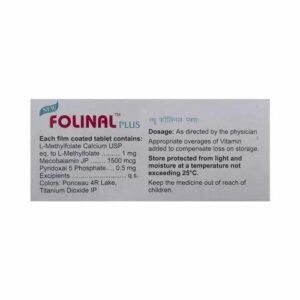IRON III HYDROXIDE POLYMALTOSE COMPLEX + FOLIC ACID
Iron Iii Hydroxide Polymaltose Complex: Iron III Hydroxide Polymaltose Complex is a medication used to treat iron deficiency anemia. It is an iron supplement that provides a stable form of iron for the body to use in the production of red blood cells.
The mechanism of action of Iron III Hydroxide Polymaltose Complex involves the release of iron ions in the gastrointestinal tract, where they are absorbed into the bloodstream. These iron ions are then utilized by the body to form hemoglobin, a protein that carries oxygen to the tissues.
The recommended dose of Iron III Hydroxide Polymaltose Complex varies depending on the severity of the iron deficiency, as well as individual patient factors. Typically, the recommended dose for adults is 100-200 mg once daily or as directed by a healthcare professional. For children, the dose is adjusted based on body weight and should be determined by a pediatrician.
Common side effects of Iron III Hydroxide Polymaltose Complex include gastrointestinal disturbances such as constipation, diarrhea, nausea, and abdominal discomfort. These side effects are usually mild and transient. In some cases, the stool may appear darker in color due to the presence of iron. Allergic reactions to the medication are rare but can occur, presenting symptoms such as rash, itching, or swelling.
It is important to note that Iron III Hydroxide Polymaltose Complex should not be taken without proper medical advice. Determination of iron deficiency and appropriate dosing should be made by a healthcare professional based on individual needs and laboratory tests. Iron supplements can interact with certain medications, so it is crucial to inform the prescribing healthcare provider about any other medications being taken concurrently.
Folic Acid: Folic Acid, also known as vitamin B9, is a synthetic form of the water-soluble vitamin folate. It is commonly used as a dietary supplement to treat or prevent certain types of anemia, particularly those caused by a deficiency of folic acid.
The primary mechanism of action of folic acid is to act as a cofactor in various biochemical reactions involved in the synthesis of DNA, RNA, and proteins. It is essential for the production and maintenance of new cells in the body. Folic acid plays a crucial role in the maturation of red blood cells and the synthesis of hemoglobin.
The recommended dose of folic acid varies depending on the individual and their specific condition. For the prevention of neural tube defects in pregnant women, the usual dose is 400-800 micrograms per day. In cases of folic acid deficiency, the dose may be increased to 1-5 milligrams per day. It is important to consult a healthcare professional to determine the appropriate dose for your specific situation.
Folic Acid is generally well-tolerated with minimal side effects when taken at recommended doses. However, some individuals may experience minor gastrointestinal symptoms such as nausea, bloating, and flatulence. In rare cases, allergic reactions may occur, characterized by symptoms like itching, rashes, and difficulty breathing. It is essential to seek medical attention if any severe or persistent side effects are experienced.
It is worth noting that folic acid supplementation may mask the symptoms of vitamin B12 deficiency. This is especially important for individuals over the age of 50 who may be at risk for vitamin B12 deficiency. Therefore, if you are taking folic acid and experience symptoms such as fatigue, weakness, or numbness, it is advisable to consult a healthcare professional for further evaluation.
Overall, folic acid is a vital nutrient that is commonly used to treat or prevent certain types of anemia. It is essential to follow the recommended dosage and consult a healthcare professional before starting any supplementation to ensure its safety and efficacy for your specific needs.

